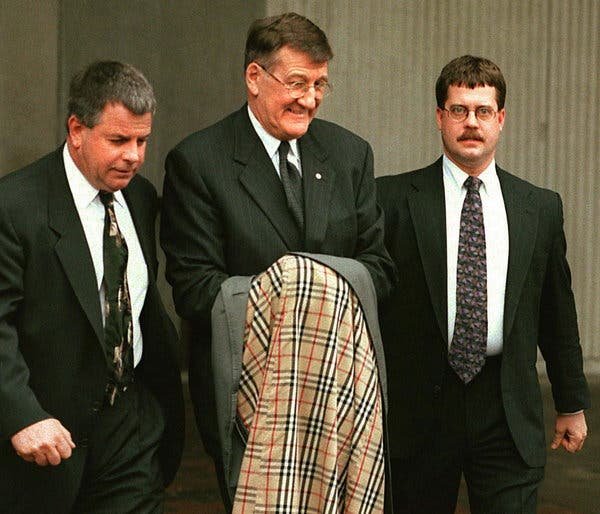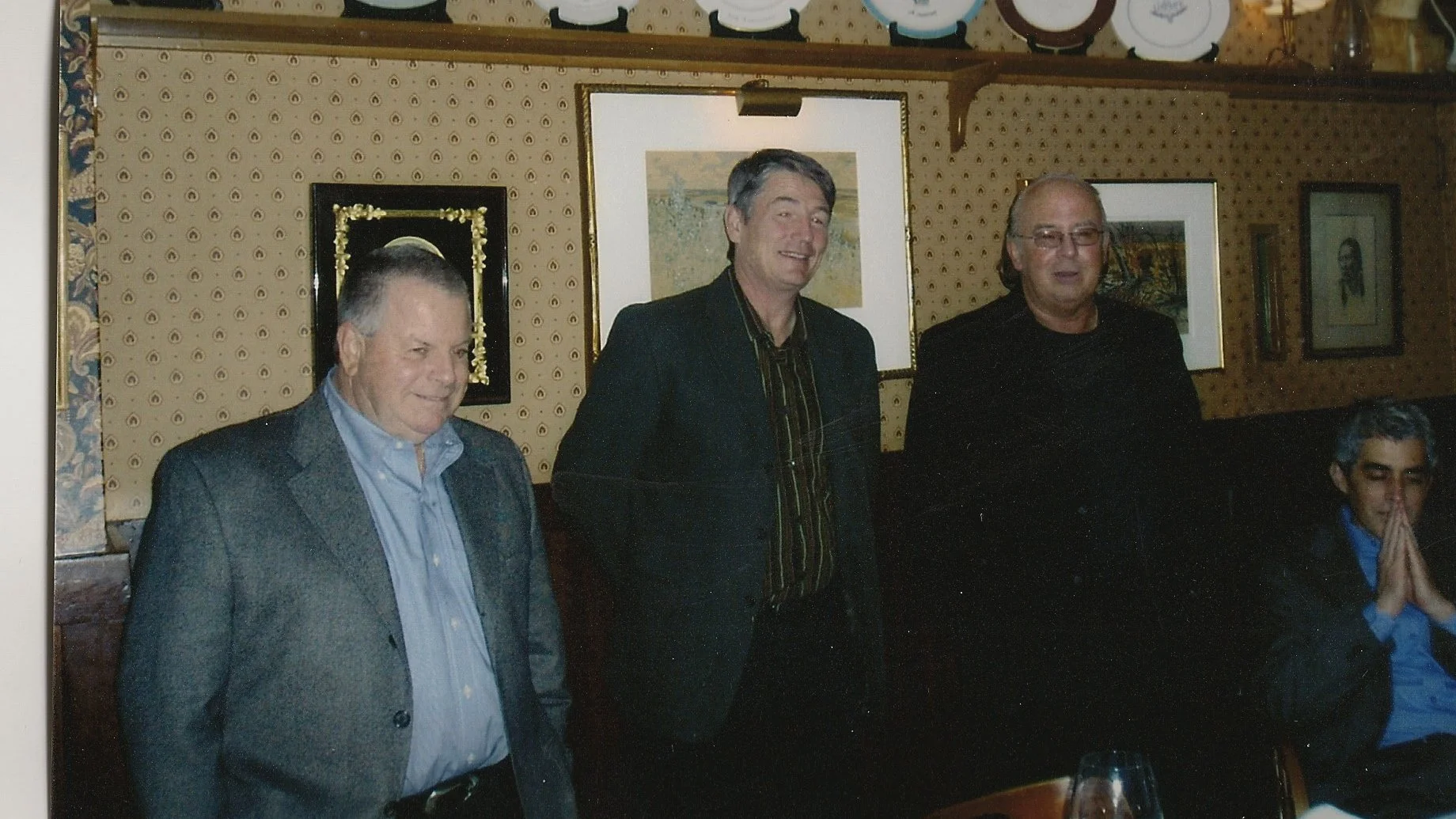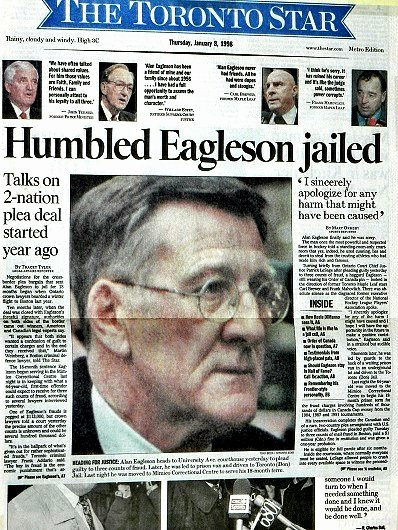How Friends In High Places Protected A Felon
Sign up today for Not The Public Broadcaster newsletters. Hot takes/ cool slants on sports and current affairs. Have the latest columns delivered to your mail box. Tell your friends to join, too. Always provocative, always independent. Stay informed.
The current controversy over Hockey Canada’s handling of sexual abuse allegations— exacerbated by HC’s Scott Smith handing out gold medals to Canada’s world champion women’s team— is not the first time the organization has been plunged into disrepute.
When it was revealed in the mid-1990s that Hockey Canada’s director of international hockey Alan Eagleson had serially defrauded, cheated, embezzled and betrayed the trust of his clients and members the revelation hit like a thunderbolt well beyond the hockey community. Pitiful pensions for Gordie Howe, self dealing at Hockey Canada, stealing players’ disability insurance were just a few of the disgraces for the original NHL Players Association director.
But an upcoming new book reveals that, despite the public outrage about his behaviour, Eagleson was protected and coddled by the highest echelons of Canadian business, politics, justice and media— right up to the Canadian prime minister’s office. In John Turner: An Intimate Biography of Canada’s 17th Prime Minister (Sutherland House) author Steve Paikin recounts how Turner would explode on anyone speaking ill of the convicted felon.
“He’s my f***ing friend,” Turner would say. “He made a mistake, and I won’t f***ing hear any more of this… I don’t want to f***ing hear of it."
Made a mistake? Eagleson’s Bernie Madoff act covered a quarter century of hundreds of acts of self dealing and fraud— all buried by compliant media and reluctant police. We had a front-row seat for the charade from 1991, the year former star player Carl Brewer and his partner Sue Foster began pulling back the curtains on his former agent and union leader for us. (For more, see our two books Defence Never Rests and Money Players at brucedowbigginbooks.ca)
Together with the late Russ Conway of the Lawrence Eagle Tribune we uncovered a pattern of Eagleson putting himself— and the NHL— ahead of his solemn duty to the players he represented. Whether it was pocketing the disability insurance of former client/ Vancouver GM Mike Gillis or seizing Hockey Canada travel benefits from the players who sacrificed for Team Canada in 1972-91, Eagleson rarely let a deal go by without carving out something for himself.
His law office— complete with downtown Toronto parking— was paid for by the NHLPA. He orchestrated fraudulent bargaining sessions between the NHLPA and the league. He lent union money to business partners, receiving prime real estate in the Collingwood, Ontario, area. He received a flat in downtown London, England, from insurance executives. And much, much more.
He made a mistake, Mr. Turner?
The entire process was backstopped by intimidation. When he sued us unsuccessfully for libel, Eagleson was never shy about letting people know he was supported by Turner, Supreme Court justices John Sopinka and Bud Estey, business executives like Hal Jackman and a raft of political pals from his days as an Ontario Conservatives party hack. And that the NHL was his pal, not his adversary.
If you were a player who got too inquisitive, a nosey agent or a media member with questions about where the money was going you knew you could lose your job if you got too close to the truth. While reporters like TSN’s Rick Westhead are now justly celebrated, we were ostracized in the tight hockey community of the 90s for taking the word of Bobby Orr over Eagleson on how the great player had been cheated out of an 18.5 percent ownership stake in the Boston Bruins.
Even when the U.S. Department of Justice and Canada’s Justice ministry finally indicted Eagleson in 1994, he received comfort and counsel from Turner in his fight to avoid extradition to Boston (where the charges were announced). Paikin writes that Turner urged defiance, calling the DOJ “the worst bastards in the world… They’ve got unlimited time and resources. Stick that big chin of yours up front and defy them.”
Paikin quotes the present-day Eagleson, now 89, saying Turner “boosted my morale in the worst time of my life. His friendship means all the world to me.” Turner backed that up by supplying a character letter for Eagleson at his sentencing in Toronto in 1998.
How about those hockey heroes who played for the nation? Who brought excitement to generations of Canadians? Who suffered injuries and mental health issues without a proper union or agent representation? What did they get? It was all chump change to Turner. And, apparently, to a long list of political, media and business leaders at the time.
When Eagleson was released after serving a laughable four months in the Mimico, Ont., jail (his U.S. judge had told him he’d have received five years “not less a day”in his Boston court) Turner staged a “Freedom Lunch” for the just-released felon at the Senator Restaurant in downtown Toronto. According to Paikin, the dozen Al Pals who showed included the crême de la crême of Ontario: former premier Bill Davis, Roy McMurtry, Paul Godfrey, David Smith, Hal Jackman, Bud Estey and Darcy McKeough.
“Gentlemen,” Paikin quotes Turner as saying, “Whatever debt Alan Eagleson owed to society has been paid in full.” According to the book, the lunch was an annual pick-me-up for Eagleson till Turner’s passing in 2020. For this and other reasons, Eagleson— who has split time between Collingwood and England after his disgrace— is unrepentant about his behaviour. As the book reveals he’s still eager to exploit any media opportunity to resurrect his profile.
Thankfully, not everyone was dazzled by him: Eagleson was removed as a member of the Order of Canada and resigned from the Hockey Hall of Fame where he had been inducted in the builder category. The NHL has wisely kept him out of its business since. Few, if any, current politicians seek him out. TV has whited-out his name.
But for those who think there are rules for “us” and rules for “them”, the Eagleson saga is perfect example of privilege serving itself.
UPDATE: Like clockwork, as soon as this column was posted, Eagleson found a journalist to plead his pathetic case. Here he bends the ear of Steve Simmons, who should instead be listening to the players Eagleson screwed with Hockey Canada from 1972-91. Ask him how he said they’’d improve their pensions, Steve, when in fact players were only reducing the owners contributions to the pension plans by playing for free. Garbage. https://torontosun.com/sports/hockey/nhl/exclusive-if-it-wasnt-for-me-there-wouldnt-have-been-a-canada-russia-series-says-hockey-pariah-alan-eagleson
Bruce Dowbiggin @dowbboy is the editor of Not The Public Broadcaster (http://www.notthepublicbroadcaster.com). A two-time winner of the Gemini Award as Canada's top television sports broadcaster, he’s a regular contributor to Sirius XM Canada Talks Ch. 167. Inexact Science: The Six Most Compelling Draft YearsIn NHL History, , his new book with his son Evan, was voted the eighth best professional hockey book of by bookauthority.org . His 2004 book Money Players was voted seventh best, and is available via http://brucedowbigginbooks.ca/book-personalaccount.aspx



